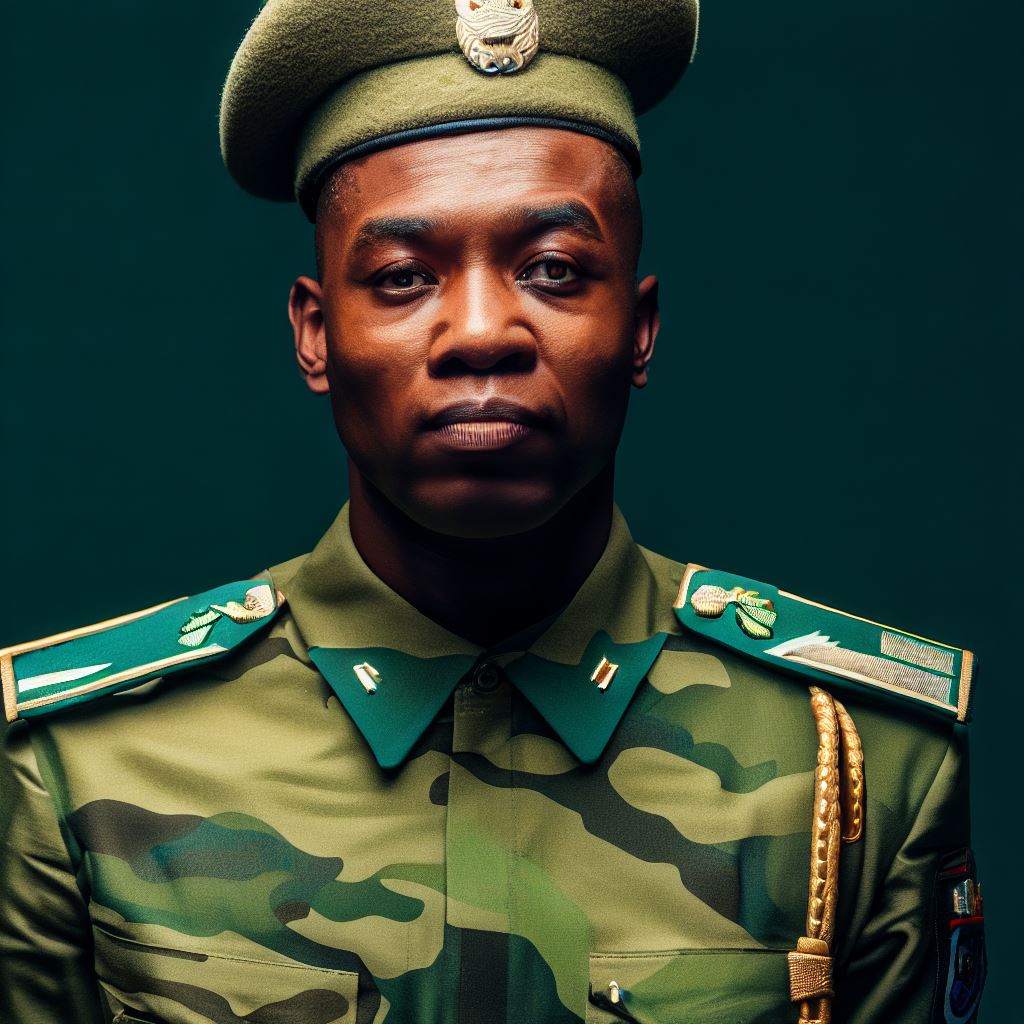Medical Requirements for Military Officers in Nigeria
Last Updated on September 14, 2023
Introduction
Medical requirements for military officers in Nigeria play a crucial role in ensuring the efficiency and effectiveness of the armed forces.
These requirements are essential for maintaining the physical and mental health of military personnel.
A. The importance of medical requirements for military officers in Nigeria
Medical requirements serve as a means to assess the overall fitness of military officers in Nigeria.
These assessments help determine their ability to carry out demanding tasks and duties in various operational environments.
Without meeting these requirements, individuals may not be able to perform their duties effectively, jeopardizing national security.
B. The significance of physical and mental health in the military
Physical health is vital in the military as it directly affects the capability to withstand rigorous training, deploy to remote areas, and engage in combat situations.
A fit soldier is more resilient and less prone to injuries, aiding in mission success.
Mental health plays a crucial role in the military as well. It enables military officers to cope with stress, make sound decisions, and maintain focus in high-pressure situations.
Neglecting mental health can lead to impaired judgment, decreased productivity, and even jeopardize the safety of the entire unit.
Overall, the medical requirements for military officers in Nigeria ensure that the armed forces are composed of physically and mentally fit individuals.
By upholding these requirements, the military can effectively execute its duties, safeguard national security, and protect citizens’ lives.
Overview of the Nigerian Military
A. Background on the Nigerian Military
The Nigerian military is comprised of three branches, namely the Army, Navy, and Air Force. The Nigerian Army is responsible for land warfare and the defense of the country.
They are involved in counterinsurgency operations, maintaining peace and security, and promoting national unity.
The Nigerian Navy, on the other hand, is responsible for protecting Nigerian waters and maritime interests.
They ensure the security of Nigeria’s coastline, territorial waters, and exclusive economic zone. The Nigerian Air Force is responsible for air defense and airspace security.
They provide air support to ground forces, conduct reconnaissance missions, and engage in air combat.
B. Medical requirements for military officers in Nigeria
Now that we have understood the general background and roles of the Nigerian military branches, let’s focus on the medical requirements for military officers in Nigeria.
Joining the Nigerian military as an officer requires meeting certain medical criteria to ensure physical fitness and overall health.
These requirements are in place to ensure that individuals are capable of fulfilling their duties and responsibilities effectively.
Medical examinations are conducted to determine the physical and mental fitness of candidates.
Some of the basic medical requirements include having a clear medical history, absence of chronic diseases, and good visual acuity.
Candidates must also have a certain level of physical fitness, as they will undergo rigorous training and potentially face demanding physical situations.
A comprehensive medical examination is conducted, including tests for blood pressure, heart rate, respiratory function, and overall physical condition.
Additionally, candidates are screened for certain infectious diseases that may be a risk to themselves and others.
These diseases include tuberculosis, HIV/AIDS, hepatitis, and other communicable diseases. Individuals with a history of psychiatric or mental health disorders may also face additional scrutiny.
The military requires candidates who can handle the varied and often intense situations faced during service.
In fact, the Nigerian military has specific medical requirements for individuals aspiring to become officers.
These requirements ensure that officers are physically fit, mentally stable, and capable of fulfilling their roles effectively.
Medical examinations, including tests and screenings, are conducted to evaluate the overall health and fitness of candidates.
By maintaining strict medical standards, the Nigerian military aims to recruit individuals who can contribute effectively to the defense and security of the country.
Read: Military Officer Pay: Understanding Salaries in Nigeria
Medical Fitness Standards for Nigerian Military Officers
Aspiring military officers in Nigeria are required to meet specific medical requirements in order to ensure they are fit for duty.
These requirements encompass physical fitness criteria, vision and hearing standards, cardiovascular and respiratory health requirements, and mental health and psychological assessments.
A. Physical Fitness Criteria
- Height, weight, and body mass index (BMI) are taken into consideration to assess physical fitness.
- Aspiring military officers must meet certain height and weight standards to ensure optimal physical capability.
- A healthy BMI within the designated range is considered essential for military service.
B. Vision and Hearing Standards
- Good eyesight is crucial for military officers, as their tasks often involve visual accuracy and precision.
- Applicants are required to have a minimum level of visual acuity without the aid of glasses or contact lenses.
- Hearing assessments are conducted to ensure candidates have adequate auditory capabilities.
C. Cardiovascular and Respiratory Health Requirements
- A healthy cardiovascular system is essential for military officers to endure physically demanding activities.
- Candidates undergo medical evaluations to assess their heart health, blood pressure, and overall cardiovascular fitness.
- Adequate respiratory health is also crucial, as officers may be exposed to harsh environmental conditions.
D. Mental Health and Psychological Assessments
- Mental health and psychological stability are vital for military officers to effectively handle stress and challenging situations.
- Psychological assessments are conducted to evaluate candidates’ mental well-being and emotional resilience.
- These assessments help identify any potential psychological issues that may hinder an officer’s performance.
In short, the medical fitness standards for Nigerian military officers encompass various aspects of health and wellness.
Aspiring officers must meet specific criteria related to physical fitness, vision, hearing, cardiovascular and respiratory health, as well as mental health and psychological assessments.
It is essential for military officers to be in optimal health to ensure they can fulfill their duties effectively and safely.
Read: Nigerian Military History: Great Officers & Leaders
Importance of Medical Requirements
A. Importance of Medical Requirements
- Operational Readiness: One of the foremost reasons for stringent medical requirements is to ensure the operational readiness of military officers. The military must have personnel who are physically and mentally fit to perform their duties effectively.
- Ability to Handle Stress: Military officers often face high-stress situations, both physically and mentally. Stringent medical assessments help identify individuals who can handle these stressors, critical in combat situations.
- Safety and Well-being: The safety and well-being of military personnel are paramount. Medical assessments detect potential health issues that could jeopardize the lives of soldiers or compromise mission success.
B. Reasons Behind Stringent Medical Requirements
- Combat Efficiency: Fit officers are more likely to perform efficiently in combat, enhancing the military’s overall effectiveness.
- Injury Prevention: Rigorous physical exams can identify vulnerabilities, reducing the risk of injuries during training and operations.
- Mental Resilience: Mental health evaluations ensure officers can cope with the psychological challenges of military life.
- Disease Control: Medical screenings help prevent the spread of contagious diseases within military units.
C. Operational Readiness and Efficiency
- Physical Fitness: Officers must meet specific physical fitness standards, ensuring they can handle the rigors of military tasks.
- Medical Skills: Medical requirements also extend to officers’ training in basic medical skills. This enables them to provide immediate assistance in emergencies.
- Regular Check-ups: Continuous health monitoring guarantees that officers maintain their physical and mental fitness throughout their service.
D. Handling Physical and Mental Stress in Combat Situations
- Combat Endurance: Medical evaluations assess an officer’s ability to endure physically demanding situations, such as long marches or extended combat operations.
- Mental Toughness: Mental health assessments gauge an officer’s resilience to trauma and stress, vital for maintaining composure in high-pressure situations.
E. Ensuring the Safety and Well-being of Military Personnel
- Early Detection: Routine medical check-ups can detect health issues early, allowing for timely intervention and treatment.
- Preventive Measures: Immunizations and health education are integral to preventing diseases and promoting overall well-being.
- Rehabilitation: Injured or ailing officers receive medical care and rehabilitation to facilitate their return to active duty.
In a nutshell, the stringent medical requirements for military officers in Nigeria are not merely bureaucratic hurdles but essential safeguards.
They are in place to guarantee that those who protect our nation are in optimal physical and mental condition, capable of facing the challenges of their profession, and ensuring the safety and well-being of all personnel.
Read: Physical Fitness for Nigerian Military Officers

Medical Screening Process
In order to ensure the overall fitness and health of potential military officers, Nigeria has established a comprehensive medical screening process.
This process includes various steps such as the initial medical examination, laboratory tests, specialist consultations, and a final medical review board.
Let’s explore each step in detail.
A. Step 1: Initial Medical Examination
Prospective military officers undergo a thorough physical examination to assess their general health and physical fitness.
This examination includes evaluations of the candidate’s height, weight, blood pressure, and heart rate.
Additionally, the doctor evaluates the candidate’s overall physical condition, checking for any signs of past injuries or medical conditions.
B. Step 2: Laboratory Tests
Candidates undergo a series of laboratory tests to assess their overall health and detect any underlying medical conditions.
These tests typically include blood tests, urine tests, and sometimes X-rays or other imaging tests.
The laboratory tests aim to identify any existing medical conditions that could impact the candidate’s ability to perform military duties effectively.
C. Step 3: Specialist Consultations
Candidates visit various specialists, including ophthalmologists, psychiatrists, dentists, and other relevant specialists.
Ophthalmologists assess the candidate’s visual acuity and identify any vision-related issues that may affect their job performance.
Psychiatrists conduct mental health evaluations to ensure that candidates are mentally fit to handle the pressures of military service.
Dentists check the candidate’s oral health and address any dental issues that may require treatment.
D. Step 4: Final Medical Review Board
After completing the initial examination, laboratory tests, and specialist consultations, candidates face a final medical review board.
The board consists of senior medical officers who review the candidate’s overall medical records and evaluations.
They carefully consider all the findings from the previous steps and make a final decision regarding the candidate’s medical fitness for military service.
This board is responsible for recommending the acceptance or rejection of the candidate based on medical grounds.
The medical screening process for potential military officers in Nigeria is a comprehensive and rigorous procedure.
It includes an initial medical examination, laboratory tests, specialist consultations, and a final medical review board.
This process ensures that only individuals who meet the necessary health and fitness standards are accepted into the military.
By prioritizing the health and well-being of its officers, Nigeria aims to maintain a strong and capable military force.
Read: Cadet Life in Nigeria: A Military Officer’s Start
Challenges and Controversies
When it comes to joining the Nigerian Military as an officer, aspiring candidates must meet specific medical requirements.
However, there are challenges and controversies surrounding these requirements, including limited access to quality healthcare and criticisms of outdated standards or potential discrimination.
A. Access to Quality Healthcare for All Aspiring Officers
- One of the main challenges concerning medical requirements is the access to quality healthcare for all aspiring officers.
- Not all regions in Nigeria have the same level of healthcare services, leading to disparities between candidates.
- Some candidates from remote or underprivileged areas may have difficulty obtaining the necessary medical examinations.
B. Limited Positions Available Due to Medical Disqualifications
- Another significant challenge is the limited number of positions available due to medical disqualifications.
- The Nigerian Military has strict medical standards to ensure the physical and mental fitness of its officers.
- As a result, many candidates may be disqualified from joining due to medical conditions or disabilities.
- This limitation creates intense competition among aspiring officers, making it harder for qualified individuals to secure a position.
C. Criticisms of Outdated Standards or Potential Discrimination
- Some controversies surrounding medical requirements revolve around criticisms of outdated standards or potential discrimination.
- There have been concerns that certain medical conditions are being wrongly categorized as disqualifying without any scientific basis.
- Others argue that the Nigerian Military should review and update its medical standards to align with modern advancements in the medical field.
- There are also allegations that some candidates may face discrimination based on their medical history or pre-existing conditions.
- These controversies raise questions about the fairness and inclusivity of the medical requirements for military officers in Nigeria.
Joining the Nigerian Military as an officer requires meeting specific medical requirements, but these requirements are not without challenges and controversies.
Limited access to quality healthcare, the limited number of positions due to medical disqualifications, and criticisms of outdated standards or potential discrimination create obstacles for aspiring officers.
It is crucial for the Nigerian Military to address these challenges and controversies to ensure a fair and inclusive system while maintaining the overall health and fitness of its officers.
Conclusion
The importance of medical requirements for military officers in Nigeria cannot be overstated.
The evolving nature of medical standards in the military makes it crucial for aspiring officers to prioritize their physical and mental health.
By doing so, they will not only enhance their chances of joining the military but also ensure their ability to perform their duties effectively and protect the nation.
It is vital for aspiring officers to understand that maintaining good health is a lifelong commitment and that they must continuously work towards staying fit and healthy.
This includes regular medical check-ups, physical exercise, proper nutrition, and seeking help for mental health issues if necessary.
It is essential to remember that the military requires individuals who are strong, mentally resilient, and capable of handling the demanding tasks and challenges that come with the job.
By meeting the medical requirements, aspiring officers demonstrate their commitment to the role and their ability to serve their country to the best of their abilities.
Therefore, aspiring officers should prioritize their physical and mental well-being, not only for their own benefit but also for the success of their military career and the safety and security of Nigeria.


